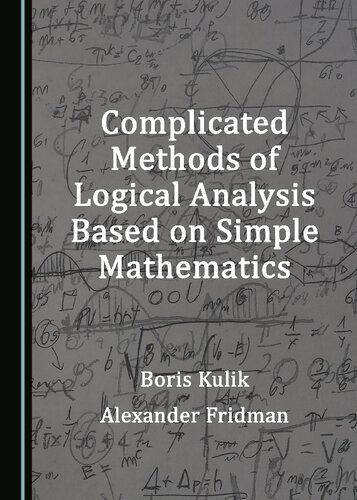

Most ebook files are in PDF format, so you can easily read them using various software such as Foxit Reader or directly on the Google Chrome browser.
Some ebook files are released by publishers in other formats such as .awz, .mobi, .epub, .fb2, etc. You may need to install specific software to read these formats on mobile/PC, such as Calibre.
Please read the tutorial at this link: https://ebookbell.com/faq
We offer FREE conversion to the popular formats you request; however, this may take some time. Therefore, right after payment, please email us, and we will try to provide the service as quickly as possible.
For some exceptional file formats or broken links (if any), please refrain from opening any disputes. Instead, email us first, and we will try to assist within a maximum of 6 hours.
EbookBell Team

5.0
98 reviewsComplicated Methods of Logical Analysis Based on Simple Mathematics
Those who want to understand logic, if they manage to pass at least an initial, though far from simple, modern course of study, eventually conclude that practically logic consists in formulating premises and a taken-from-nowhere assertion in an incomprehensible language and then proving or disproving cause-consequence links between them. Conversely, many topical tasks of logical analysis, such as forming and testing hypotheses, inferring consequences with predefined properties, and searching for, and analysis of, logical errors and inconsistencies in reasoning, among others, are outside the scope of this discourse. They are scattered haphazardly in works on theory of argumentation, non-classical logics, and artificial intelligence. This book demonstrates the capabilities of two relatively simple mathematical systems developed by the authors, namely E-structures and n-tuple algebra, which allow the modelling of various types of reasoning and solve the above and some other tasks of logical analysis.